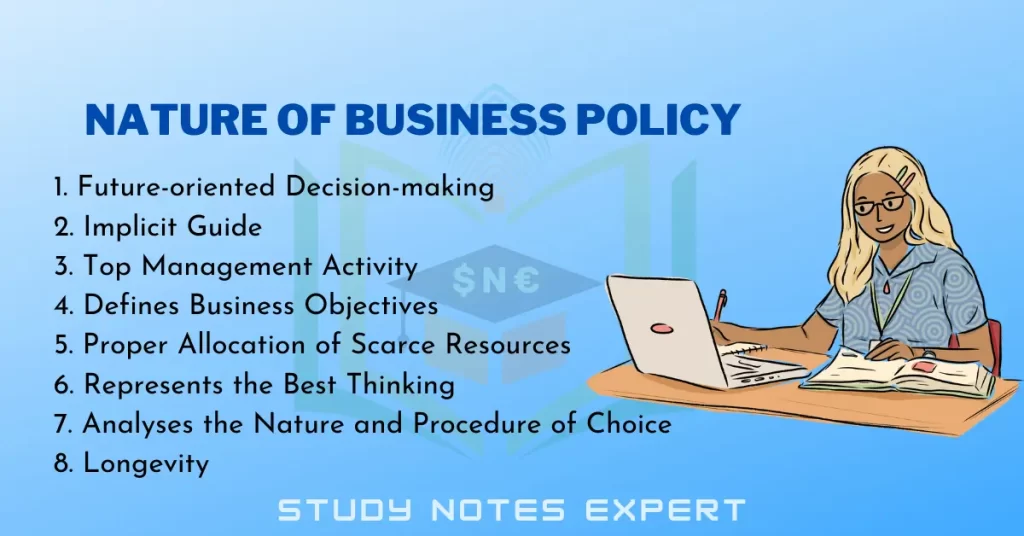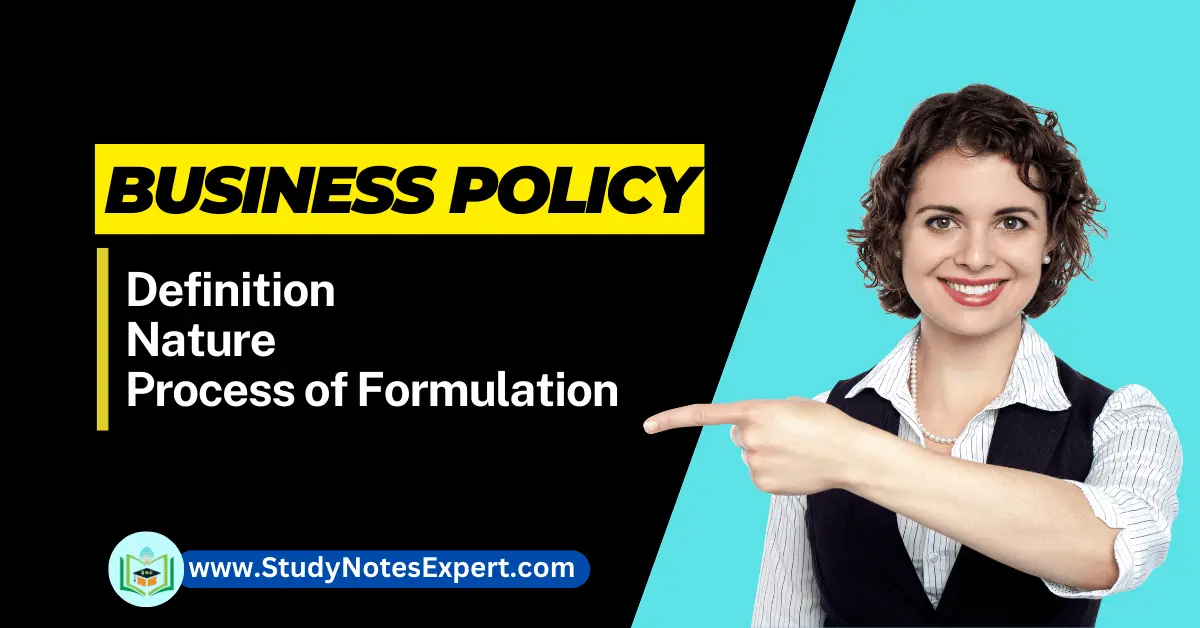Business policy is a set of management decisions to sustain and improve the firm’s competitive advantage. It is based on a system of internal and external values. The area within which decisions can be taken by the subordinates in an organisation is called policies. It allows the lower-level management to make decisions regarding the organisational issues and disputes without approaching the top-level management.
Definitions of Business Policy
According to Koontz and O’Donnell, “Policies delimit an area within which a decision is to be made and assure that decision will be consistent with and contribution to objectives.”
According to Miller, “A policy is a statement or a commonly accepted understanding of decision-making, criteria or formulae, prepared or evolved to achieve economy in operations by making decisions relatively routine on frequently occurring problems and consequently, facilitating the delegation of such decisions to lower managerial levels”.
Business policies are long-term plans, also termed strategic management and long-range planning. These are man-made policies or predefined sets of actions. It is framed to direct and assess the work performance of an organisation towards the organisational objectives.
Nature of Business Policy

The nature of the business policy is as follows:
1. Future-oriented Decision-making
The business policy generally entails formulating decisions about existing business prospects.
2. Implicit Guide
A business policy acts as an implicit guide that outlines the general limits and directs the actions of managers for the firm.
3. Top Management Activity
These decisions are taken by the top-level authorities after analysing the strengths and weaknesses of the firm in terms of the product price, quality, leadership position, resources, etc., which are associated with its environment.
4. Defines Business Objectives
A business policy states the main purpose, the organisational character, the description of what is to be achieved, and the utilisation of resources for business objectives.
5. Proper Allocation of Scarce Resources
It focuses extensively on allocating scarce resources. Theoretically, strategy is allocating resources, while planning sets the distribution boundaries.
6. Represents the Best Thinking
The business policy denotes the best outlook of the firm to achieve its business objectives in the present social and economic situation.
7. Analyses the Nature and Procedure of Choice
A business policy studies the nature and procedure of choice concerning the prospects of independent firms. This study is carried out by the person responsible for making and executing decisions.
8. Longevity
Usually, all business policies are long-term. These are develop after a comprehensive assessment of several internal and external factors that influence the firm’s market position.
What is the Process of Formulating Business Policy?
The most significant aspect of business planning is the formulation of business policy. It is vital to frame sound policies to ensure the smooth functioning of an organisation. If an organisation is not following any guidelines, then this may lead to disorder and dictatorship. Therefore, careful planning is mandatory for the formulation of business policies. The following are the different steps involving in this procedure:
1. Defining the Policy Area
In the first step, entrepreneurs must specify the policy area for which a policy is framed. While stating the policy area, the needs and objectives of an organisation should be kept in mind. The policy area should not overlook the market expectations and major regions essential to the firm.
2. Recognising the Policy Alternatives
The firm must identify the policy alternatives after defining the policy area. These alternatives are on the basis of internal and external environmental analysis. Where the internal environment states the Strengths and weaknesses of an organisation, the external environment helps identify the opportunities available and the level of competition.
3. Assessing the Alternatives
The best policy alternative must be considered from all the possible options. This action involves a Proper assessment of all available choices. There must be mutual consent over selecting an alternative, which is crucial for the business. Along with this, the factors like price, advantages, resources, market tactics, etc., should also be evaluated.
4. Choose the Alternate Business Policy
Once all alternatives are properly assessed, the businessman should select the most suitable option. The choice of an alternative is a long-term decision; therefore, a business person should first apply it on a trial basis. A business person should avoid carelessness to attain the firm’s goals and targets.
5. Execute the Business Policy
During the trial run, there may be Suggestions regarding improving business policy. If the policy is accurate, then it can apply. A business person must explain the approach to those running the procedure.
6. Monitor
An intensive discussion should be carried out regarding the execution and influence of different clauses or provisions in the policy. It largely helps the firm in the implementation of policy.
What is Business Policy and Strategic Management?
Business policy and strategic management is the process of formulating and implementing policies and plans that will guide the future direction of a company. It involves setting goals, analyzing the current situation, developing strategies, and implementing and monitoring progress.
How we Prepare a Better or more Beneficial Business Policy?
To formulate a better and more beneficial business policy, you need to understand your goal and all the primary activity of your organization. Follow the complete “Business Policy Formulation” process step by step and get better output.

